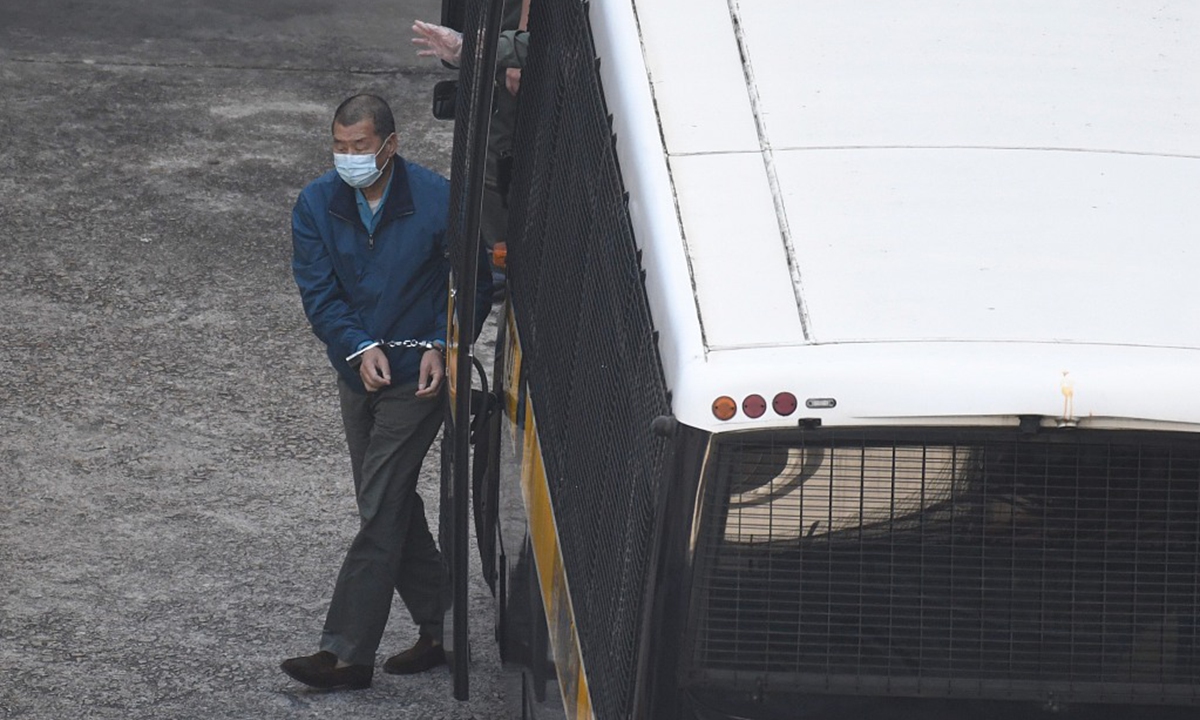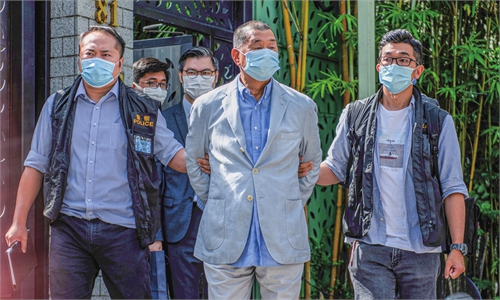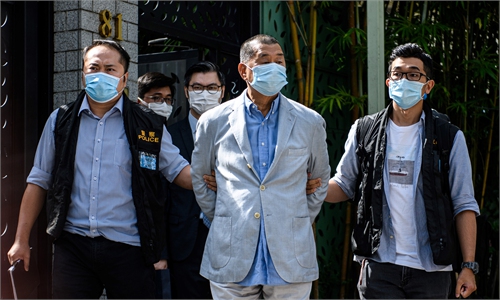Interpretation of National Security Law for Hong Kong from top legislature conveys great significance and is imperative: experts

Jimmy Lai Photo: VCG
Hong Kong's Department of Justice (DOJ) applied to a local court on Tuesday to ask for an adjournment to the closely watched national security trial of Jimmy Lai after the Hong Kong Special Administrative Region government made a request to the central government for an interpretation of the national security law (NSL) for Hong Kong, after the city's top court upheld an earlier High Court decision to allow a British barrister to defend Lai against charges under this law. The ruling triggered huge controversy and led to a strong opposition from central government agencies and the local government.
The justice department has written to Hong Kong High Court for asking a seven-day adjournment in Lai's trial, which had been scheduled to start on December 1. Some experts believe that the latest move aims at waiting for the central government to interpret the NSL for Hong Kong - the first time since the law came into effect in 2020, which will convey great significance in clarifying the original legislative intent and objectives of the law, especially when the application of the law deviates from its correct course with hidden risks of endangering national security.
John Lee, chief executive of the HKSAR, told a press briefing on Tuesday that he has submitted a request to the central government for an interpretation of the NSL for Hong Kong. A major question has to be answered by this interpretation: can overseas lawyers or barristers who have not obtained full practicing certificates in Hong Kong handle cases involving offenses endangering national security based on the legislative intent and objectives of the NSL for Hong Kong?
Lai, a key anti-government figure in Hong Kong and founder of secessionist newspaper Apple Daily, who has been dubbed a "modern-day traitor," will stand trial before a panel of three High Court judges on two counts of conspiracy to collude with foreign forces and a similar charge of collusion under the NSL for Hong Kong.
His defense team hired British barrister Tim Owen KC in early August and the Chief Judge of the High Court Jeremy Poon Shiu-chor approved in October Lai's bid to hire Owen in his national security trial, according to media reports. The ruling triggered strong opposition from local legal experts and professionals but the city's top court rejected on Monday an appeal by the DOJ to overturn the ruling, which has left no other way but an interpretation of the law by the National People's Congress Standing Committee (NPCSC) - the country's top legislature.
As the Hong Kong courts and HKSAR government have no way to resolve differences on national security cases, the only way is to seek interpretation of the law from the NPCSC, Lau Siu-kai, deputy head of the Chinese Association of Hong Kong and Macao Studies, told the Global Times on Tuesday.
"The Court of Final Appeal uses common law principles to deal with national security issues but the legislative intent of the NSL for Hong Kong is different from the nature of general laws. When it comes to national security cases, it has to be no risk at all," Lau said.
While Lee submitted the request on late Monday night to the central government, the State Council's Hong Kong and Macao Affairs Office and the central government's liaison office in Hong Kong voiced support for the CE's decision, saying that the latest court ruling to allow the UK lawyer to represent Lai violates the legislative spirit and legal logic of the NSL for Hong Kong.
Hiring an overseas lawyer to defend a national security case has triggered huge controversy in Hong Kong's legal sector as a number of prominent lawmakers and legal experts voiced concerns about the matter, as allowing an overseas lawyer to engage in a case concerning collusion with foreign and external forces to endanger national security is very rare. It will also provide convenience for foreign forces to interfere in the case, hurting the reputation of local lawyers and the city's rule of law.
The ruling of the Court of Final Appeal on Lai's defense case was mainly based on the review and response of the legality and appropriateness of the new viewpoints and issues put forward by the DOJ during the appeal process, and the appeal was rejected in accordance with the general thinking and judgment standards, missing out the uniqueness and important arguments of the NSL for Hong Kong, Tian Feilong, a legal expert at Beihang University in Beijing, told the Global Times on Tuesday.
"The Court of Final Appeal has its professional standards and jurisprudential basis for its judgment, but it objectively creates risks to national security and the possibility of distortion of the original intent and provisions of the NSL for Hong Kong," he said.
Since the city's return to the motherland, there have been five interpretations to clarify some controversies including the one in 2016 about the oath-taking procedure after several young anti-government legislators took insulting oaths at the Legislative Council, according to local media. The upcoming interpretation will be the first since the NSL for Hong Kong took effect in 2020.
"As it will be the first interpretation for the NSL for Hong Kong, it should be carried out cautiously and professionally, based on a balance between national security and freedom rights and to protect fair trial rights and defense rights," Tian said. "From the past experiences, there's no need to be worried or surprised about the interpretation."
While the NPC Standing Committee is scheduled to hold a regular meeting next week, "there's no information about whether it will arrange the interpretation soon," Tam Yiu-chung, a member of the NPC Standing Committee from Hong Kong, told the Global Times on Tuesday. "But I fully support the CE's decision."



